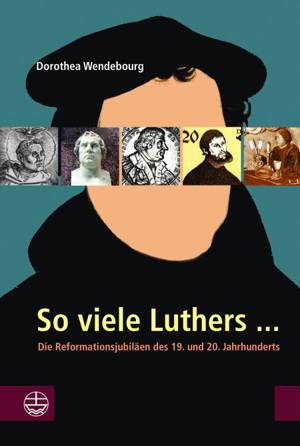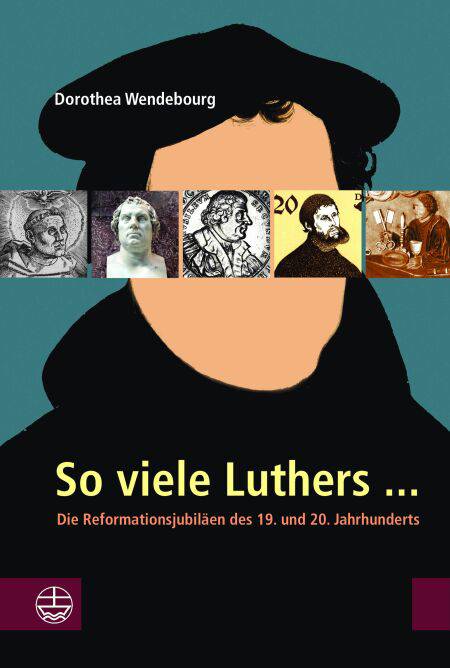
- Retrait gratuit dans votre magasin Club
- 7.000.000 titres dans notre catalogue
- Payer en toute sécurité
- Toujours un magasin près de chez vous
- Retrait gratuit dans votre magasin Club
- 7.000.0000 titres dans notre catalogue
- Payer en toute sécurité
- Toujours un magasin près de chez vous
So viele Luthers ... EBOOK
Die Reformationsjubiläen des 19. und 20. Jahrhunderts
Dorothea Wendebourg
Ebook | Allemand
28,99 €
+ 28 points
Description
Die Geschichte der Reformationsjubiläen, deren Anfänge mit dem Beginn des Phänomens "historisches Jubiläum" überhaupt zusammenfallen, ist eine Geschichte immer neuer Bilder der Reformation und namentlich Martin Luthers. Jede Epoche verband damit, was ihr gut und teuer erschien, und feierte in den Jubiläen ihre eigenen Werte und somit sich selbst. Das gilt insbesondere für die letzten beiden Jahrhunderte. Freiheit, Bildung, Aufklärung und Toleranz, die deutsche Nation, die Veredelung des deutschen Volkstums – um nur die wichtigsten Beispiele zu nennen – wurden mit Luther und der Reformation verbunden und verherrlicht. Es gab immer auch Gegenstimmen, die eine Rückbesinnung auf die kirchlich-theologische Dimension der Reformation forderten, doch durchsetzen konnten sie sich im Chor der Feiernden meist nicht.
Das Buch der renommierten Kirchenhistorikerin Dorothea Wendebourg geht den bedeutenderen Reformationsjubiläen des 19. und 20. Jahrhunderts nach. In zwei kürzeren Teilen wird zudem ein Überblick über die gesamte Geschichte der Reformationsjubiläen seit 1617 sowie eine Detailstudie über das seinerzeit spektakuläre Jubiläum von 1921 geboten.
[So many Luthers ... Anniversaries of the Reformation of the 19th and 20th Century]
The history of the anniversaries of the Reformation whose beginnings coincide with the general beginning of the phenomenon of historical anniversary, is a history of ever new images of the Reformation and particularly Martin Luther. Every period saw in these images what was dear and precious to it. It celebrated in the anniversary its own values and so itself. This is particularly true for the last two centuries. Liberty, education, enlightenment and tolerance, the German nation, the refinement of the German national character (Volkstum) – just to mention the most important examples – became associated with Luther and the Reformation. There existed always opposite views but mostly they could not be heard in the chorus of celebration.
The book of the renowned historian of the Reformation, Dorothea Wendebourg, examines the more important anniversaries of the Reformation in the 19th and 20th century. Furthermore, three shorter sections contain an overview of the entire history of the anniversaries of the Reformation since 1617, a detailed study of the once spectacular anniversary in 1921, and a contribution concerning the Jewish commemoration of Luther in the 19th century.
Das Buch der renommierten Kirchenhistorikerin Dorothea Wendebourg geht den bedeutenderen Reformationsjubiläen des 19. und 20. Jahrhunderts nach. In zwei kürzeren Teilen wird zudem ein Überblick über die gesamte Geschichte der Reformationsjubiläen seit 1617 sowie eine Detailstudie über das seinerzeit spektakuläre Jubiläum von 1921 geboten.
[So many Luthers ... Anniversaries of the Reformation of the 19th and 20th Century]
The history of the anniversaries of the Reformation whose beginnings coincide with the general beginning of the phenomenon of historical anniversary, is a history of ever new images of the Reformation and particularly Martin Luther. Every period saw in these images what was dear and precious to it. It celebrated in the anniversary its own values and so itself. This is particularly true for the last two centuries. Liberty, education, enlightenment and tolerance, the German nation, the refinement of the German national character (Volkstum) – just to mention the most important examples – became associated with Luther and the Reformation. There existed always opposite views but mostly they could not be heard in the chorus of celebration.
The book of the renowned historian of the Reformation, Dorothea Wendebourg, examines the more important anniversaries of the Reformation in the 19th and 20th century. Furthermore, three shorter sections contain an overview of the entire history of the anniversaries of the Reformation since 1617, a detailed study of the once spectacular anniversary in 1921, and a contribution concerning the Jewish commemoration of Luther in the 19th century.
Spécifications
Parties prenantes
- Auteur(s) :
- Editeur:
Contenu
- Nombre de pages :
- 294
- Langue:
- Allemand
Caractéristiques
- EAN:
- 9783374051984
- Date de parution :
- 30-06-17
- Format:
- Ebook
- Protection digitale:
- Digital watermarking
- Format numérique:

Les avis
Nous publions uniquement les avis qui respectent les conditions requises. Consultez nos conditions pour les avis.






